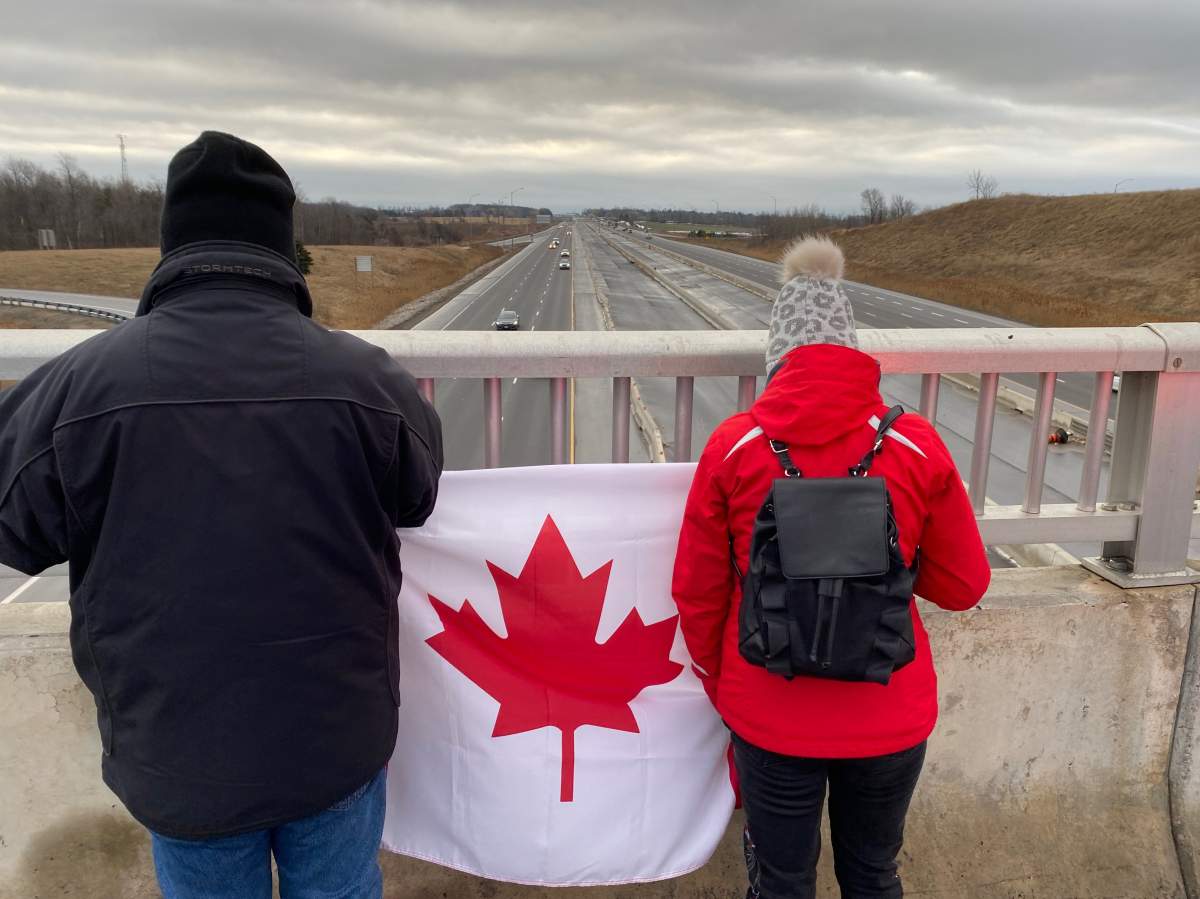Hundreds of first responders and members of the public turned out Friday for a procession to pay tribute to a slain Ontario Provincial Police officer as calls grew for the federal government to reform its bail policy.

The procession carrying 28-year-old Const. Greg Pierzchala’s body started at the coroner’s office in Toronto and ended in his hometown of Barrie, Ont., about an hour later.
Police officers and other first responders lined up outside the coroner’s office to salute Pierzchala as the procession started.
Hundreds of people — some civilians, some in uniform — packed onto overpasses along Highway 400, raising their hands as a sign of respect, as the hearse and police cars with flashing lights passed by.
Police have said Pierzchala was shot dead in an “ambush” attack earlier this week after he responded to a call for a vehicle in a ditch west of Hagersville, Ont.
Pierzchala had been with the OPP for just over a year and he had been notified that he had passed his 10-month probation period hours before his death. He was previously a special constable at Queen’s Park who, as a boy, dreamt of joining the police ranks.
- School bus carrying 40 students crashes in Ontario town, 4 sent to hospital
- Ontario Line opening date uncertain, construction to be finished in ‘early 2030s’
- ‘It was a betrayal’: Woman tells sex assault trial Frank Stronach tried to rape her
- Winter mix delivers Ontario freezing rain, blowing Prairie snow and East Coast wallop
Carrique has said Pierzchala gained his colleagues’ respect during his short time on the force.
“They knew they could rely upon him in the most dangerous and stressful of situations,” he said at a news conference this week.
Insp. Phil Carter, the OPP’s detachment commander for Haldimand County, has called Pierzchala’s death a “crushing loss.”
“It has been an unimaginable and heartbreaking loss for our officers that worked alongside provincial Const. Greg Pierzchala. He was a son, a brother and a friend,” he said at a news conference.

Get daily National news
“He is no longer with us and that hurts.”
Pierzchala’s funeral will be held in Barrie on Jan. 4. The OPP is to announce more details in the coming days.
Randall McKenzie, 25, and Brandi Crystal Lyn Stewart-Sperry, 30, each face a charge of first-degree murder in his death.
Court documents show McKenzie had been initially denied bail, and was later granted it upon review, months before Tuesday’s shooting in a separate case involving a number of assault and weapons-related charges.
A warrant was issued for his arrest after he failed to show up for a court date in August, the documents show.
Calls have emerged in recent days for the federal government to reform bail policy in Canada.
On Friday, Conservative Party of Canada Leader Pierre Poilievre urged the Trudeau government to “reverse its catch and release bail policy” — referring to Bill C-75, a law passed by the Liberals in 2019 to update bail provisions in the Criminal Code by instructing police and judges to use a “principle of restraint” for bail.
The law gave courts and police more powers to put restrictions on people accused of crimes, so long as they promised to appear in court.
“What we need to do instead is keep the small number of repeat habitual violent offenders behind bars and when they are newly arrested, deny them bail until such time as their trials are completed,” Poilievre said.
Speaking to reporters Wednesday, the OPP commissioner said he was “outraged” that McKenzie had been out on bail.
“I know there’s a lot of interest to see that changes are made to ensure, where possible, people who are charged with violent offences that are firearms related are not in those positions moving forward,” Carrique said during a news conference.
On Thursday, Ontario Premier Doug Ford said in a statement that a “failed bail system” had led to innocent people losing their lives “at the hands of dangerous criminals who should have been behind bars — not on our streets.”
“Enough is enough. More must be done to fix a system that is far too often sacrificing the safety of our public and police officers instead of cracking down on the perpetrators who repeatedly commit these heinous crimes.”
But Shawn King, vice-president of the Criminal Trial Lawyers Association, said there is no need for the federal government’s bail policy to be reformed.
“The underlying issue that really needs to be addressed here is not changing the bail policies, it’s trying to deal with the underlying conditions that cause these people to offend,” he said.
According to court documents, McKenzie has a history of addiction and pleaded guilty to an armed robbery in 2017, saying he needed money for drugs.
Providing support for offenders who are struggling with addiction would be more efficient than keeping them behind bars, King said.
In part meant to reduce the overrepresentation of Indigenous Peoples in Canadian jails, Bill C-75 requires courts to consider the circumstances of accused individuals from vulnerable populations when deciding whether bail should be granted.
Court documents do not indicate why McKenzie was granted bail, but say that he is from the Onondaga First Nations of the Six Nations of the Grand River Territory and has experienced the negative impacts of colonialism.
– With files from David Fraser







Comments
Want to discuss? Please read our Commenting Policy first.